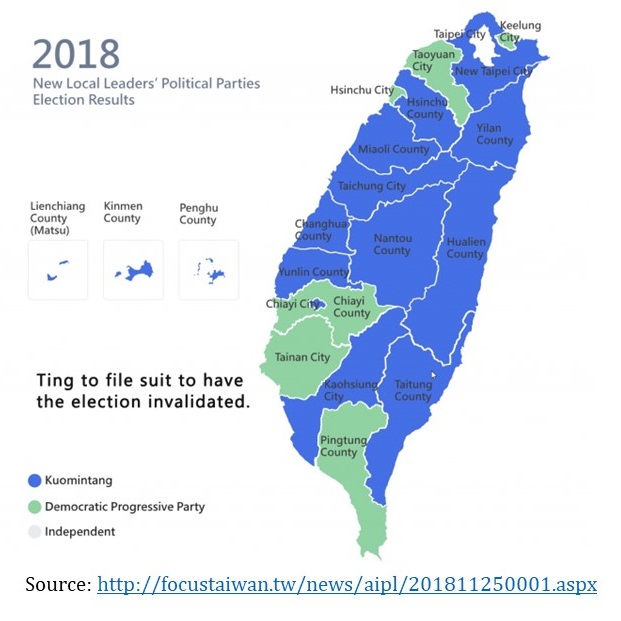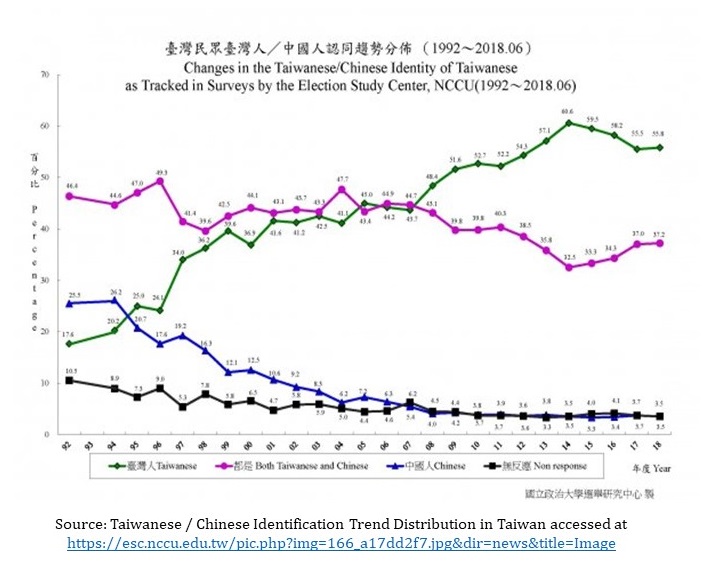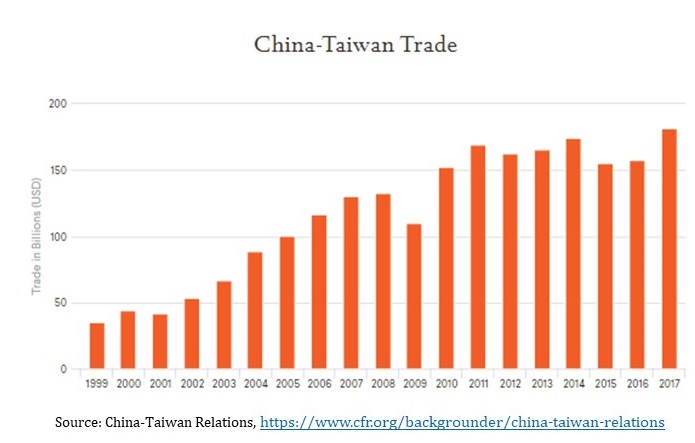On 24 November 2018, the ‘nine-in–one’ local government and mid-term elections were held in Taiwan. The Democratic Progressive Party (DPP) lost seven out of the 13 cities and counties, including two special municipalities; Taichung and Kaohsiung. The party has now majority only in six cities and counties. Taipei city went to an independent candidate. On the other hand, Kuomintang party (KMT) got 15 cities and counties, including three municipalities.

Taking the responsibility of the defeat, Tsai Ing-wen resigned as the chairwoman of the DPP but will continue to be the President of Taiwan till 2020. The election result marks a major shift from the 2014 mid-term elections. In 2014, DPP won 13 seats and the KMT got 6 and the independent candidate secured 3 seats.
Besides the local election, there was also a referendum held on ten questions simultaneously. The questions were divided into three parts; the status of Taiwan Status, issues relating to LGBT right and issues related to the environment and food safety. The referendum on swapping of the name from the ‘Chinese Taipei’ to ‘Taipei’ while participating in the Olympics was defeated. The Taiwanese are wary of the fact that they should not lose their right to compete in the Olympics just because of the change of the name.1 Two proposals to expand the same-sex marriage rights and education were also rejected. Demographic, cultural and institutional factors are responsible for the defeat of the referendum. Taiwan has the third lowest birth rate in the world (1.13 per cent).2 Issues pertaining to the energy policy were passed wherein the voters supported the reduction in the use of coal. They also voted to repeal legislation that will stop all nuclear power production by 2025. The referendum indicates that the issue of air pollution has become important for Taiwanese citizens.3
Earlier, in Taiwan, a referendum to be passed needed 50 per cent of eligible voters to vote in favour of the proposed referendum. In December 2017, the Legislative Yuan amended the Referendum Act by lowing the previous limit of 50 per cent to 25 per cent of the eligible voters.4
Reasons for the Defeat
Reportedly, China has tried to influence the election through a misinformation campaign on social media and by illegal financing pro-China publications.5 The DPP’s initiative to lower the pension of the retired public servants also annoyed the citizens.6 Yet another reason could be the more rigorous campaigning of the KMT party and selection of right candidates from the province. In Kaohsiung province, they chose Han Kuo-yu as their candidate. He raised local issues and promised the local population to ‘make Kaohsiung great’ again and thus had a mass appeal.7
The issues raised during the mid-term elections were of local importance as compared to the issues of the general elections. The verdict means that the society has no consensus on the certain issues and there is growing disenchantment of the slowing down of the economy, dissemination of the social welfare schemes, limited success of the New Southbound Policy and cutting down of the diplomatic allies that have led to the shrinking of diplomatic space for Taiwan.
During the midterm elections, the external environment was unfavourable to the DPP and the ineffectiveness of the DPP to implement its policies further added to its defeat. The main issue was pertaining to the LGBT rights. This was coupled with the ineffectiveness of the DPP to implement its policies. Additionally, there was mistakes in the DPP election campaign themes, wrong timing, policy flip-flops and debatable execution that cumulatively led to the alienation of citizens with the government.8
Response from the US and China
The US state department praised the people of Taiwan for once again ‘demonstrating the strength of democracy’ by holding free and fair elections. 9 On 28 November 2018, two US Navy ships-the guided-missile destroyer USS Stockdale and supply vessels USNS Pecos-sailed through the Taiwan Strait. China has expressed concern on the development and the spokesperson said: “We hope the US side will carefully handle Taiwan related issues, thus avoiding damage to China-US relations and to peace and security in the Taiwan Straits.”10 During the G20 meeting, the issue of Taiwan was discussed; Xi Jinping reiterated China’s position on Taiwan and the US reiterated that it would ‘continue to adhere to the one-China policy’. 11 Amid the US-China trade war, the response by China appears to be subtle.
In June 2018, the US has upgraded the de facto embassy in Taiwan; as ‘a symbol of strength and vibrancy’ of the relationship between the US and Taiwan. The US spent USD 250 million to upgrade the American Institute in Taiwan (AIT) and a senior US official attended the opening ceremony. China reacted to the development and said, “We urge the US to honour the commitments it has made to China and correct its mistake to avoid harming China-US relations and peace in the Taiwan Strait.12 Notably, in 2017, the trade between the US and Taiwan was USD 87 billion of goods and services. The US is the 12th largest trading partner of Taiwan.
China has responded positively on the election results. The spokesperson of the Taiwan Affairs Office of the State Council said the ‘results reflect the strong will of the public in Taiwan to share the benefits of peaceful development across the Taiwan Straits’, and their desire to improve the island’s economy and people’s well-being.13 China has further proposed that If Taiwan removes hindrances in the cross-Strait communications, it is ready to expand exchanges with Taiwan. 14 The success of the KMT government in the local elections is an added advantage for China.
Response from Taiwan
The Mainland Affairs Council (MAC) has underscored that China should not unilaterally interpret the elections results and also the outcome of the referendum held alongside the elections. At best, it is the manifestation of a ‘mature development of democratic politics’. Further, the election results reflected the majority’s hopes of benefiting from peaceful ties.15
Implications for 2020 General Elections
In 2016 Tsai Ing-wen won her landslide victory on her opposition to the economic integration between Taiwan and China and promise to relaunch the ‘New Southbound Policy” but the policy has shown limited success until now and China is still Taiwan’s largest trade partner. Thus the basic premises of economic diversification has not taken place.

The chart illustrates that China-Taiwan trade is on the upwards trajectory. In March 2018, it was at 44.8 per cent. On the Contrary, Taiwan’s export dependence on China has increased in the last two years under the New Southbound Policy. With the relaunch of the New Southbound Policy, Tsai Ing-wen had promised to increase the international status of Taiwan but it has not happened. On the contrary, in last two years, Taiwan has lost six diplomatic allies in two years; El Salvador (2018), Burkina Faso (2018), Dominican Republic (2018), Panama (2017), Gambia (2016) and Sao Tome and Principle (2016).

Taiwan’s economy is not progressing the way Taiwanese anticipated it to be under Tsai Ing-wen. In 2017, Taiwan’s economic growth was 2.89 per cent, higher than in 2016 when Tsai took over as president. In 2018, the growth forecast is 2.48 per cent.16 According to the UBS research report, the GDP of Taiwan will go down from 3 per cent to 2.6 per cent in 2019. Nevertheless, the blue wave of the coming of KMT in a big way does not indicate that the Taiwanese prefer moving closer to China. The graph indicates the 55.8 per of the population prefers to maintain the Taiwanese identity while there is a sharp decline in number (3.5 per cent) that prefers unification.
Following the debacle in the midterm elections, Tsai Ing-wen will have to review her policies including the cross-Strait strategy. The outcome of the elections has raised doubts about Tsai Ing-wen been re-elected in 2020 elections. Thus raising questions about her political future and DPP coming back to power in 2020. There is a need for serious introspection of the issues that will be involved in the general elections. According to a survey conducted in January 2018, 28 per cent of the respondent favour DPP, 24 per cent KMT but 43.4 per cent favoured independent candidates.17 The next general elections will be crucial for Taiwan to decide its status as an ‘independent’ nation.
Under the DPP led government, there has been an upward trajectory in India-Taiwan relation. Under the New Southbound Policy, the trade has gone up from USD 1.19 billion in 2001 to USD 6.4 billion in 2017. The Taiwanese investments in India have also started coming in gradually. Until now, the DPP government has prioritized its investments in India, James Huang has said, “India is important to us in terms of trade and Investments. We didn’t pay enough attention to India in the past”. It is uncertain, if the KMT comes to power in 2020, whether they would still prefer the diversification of the investments or not.
Refrences
- https://www.scmp.com/news/china/politics/article/2174828/taiwan-set-high-election-turnout-voters-queue-deliver-their
- https://www.scmp.com/comment/insight-opinion/united-states/article/2175733/three-reasons-why-same-sex-marriage-still-no
- https://www.nytimes.com/2018/11/26/world/asia/taiwan-election.html
- https://nationalinterest.org/feature/blue-wave-kmt-wins-big-taiwans-midterms-37152
- https://www.washingtonpost.com/world/taiwanese-president-quits-party-leadership-after-pro-china-rivals-claim-ballot-landslide/2018/11/25/46ce7fa4-f078-11e8-9236-bb94154151d2_story.html?utm_term=.d64872e058ce
- https://www.japantimes.co.jp/news/2018/11/26/asia-pacific/politics-diplomacy-asia-pacific/taiwanese-pro-china-partys-big-win-puts-tsai-ing-wens-future-doubt/
- https://www.scmp.com/news/china/politics/article/2174915/rank-outsider-mayor-kaohsiung-meet-man-who-wooed-taiwans
- https://taiwaninsight.org/2018/11/30/a-blue-wave-or-a-green-flop-making-sense-of-taiwans-2018-local-elections/
- https://www.washingtonpost.com/world/taiwanese-president-quits-party-leadership-after-pro-china-rivals-claim-ballot-landslide/2018/11/25/46ce7fa4-f078-11e8-9236-bb94154151d2_story.html?utm_term=.d64872e058ce
- http://www.chinadaily.com.cn/a/201811/30/WS5c008b52a310eff30328bf24.html
- http://www.chinadaily.com.cn/a/201812/03/WS5c042c82a310eff30328e85f.html
- https://www.fmprc.gov.cn/mfa_eng/xwfw_665399/s2510_665401/t1568234.shtml
- http://www.chinadaily.com.cn/a/201811/26/WS5bfaff73a310eff30328aeb2.html
- http://www.chinadaily.com.cn/a/201811/29/WS5bfeff5aa310eff30328ba50.html
- http://www.taipeitimes.com/News/front/archives/2018/11/26/2003704939
- https://chinapost.nownews.com/20181129-469224
- http://focustaiwan.tw/news/aipl/201801280013.aspx
Image Source: https://gdb.voanews.com/F1603BF7-494E-4583-B785-2ED4E5CDD97D_w1023_r1_s.jpg









Post new comment